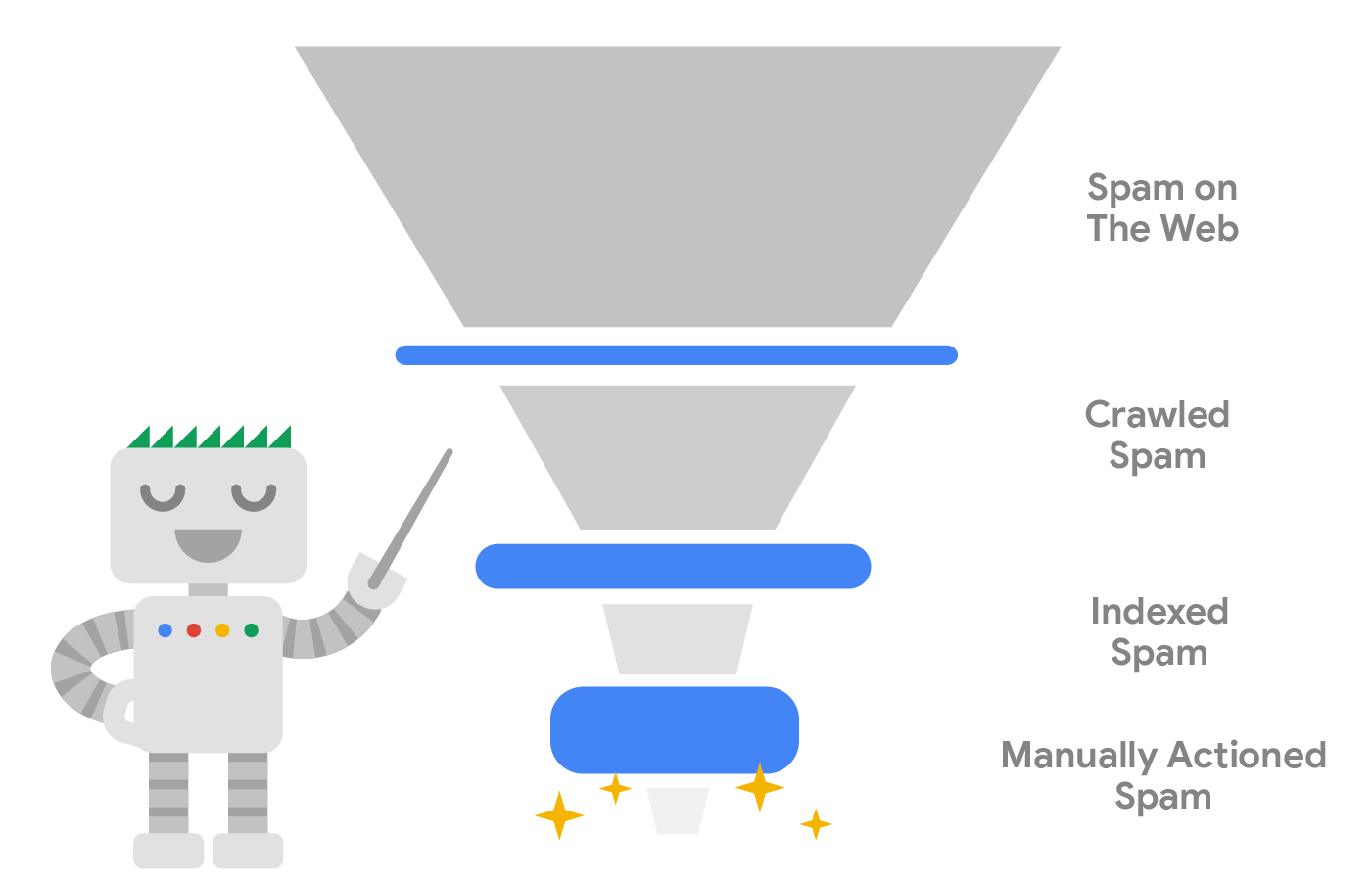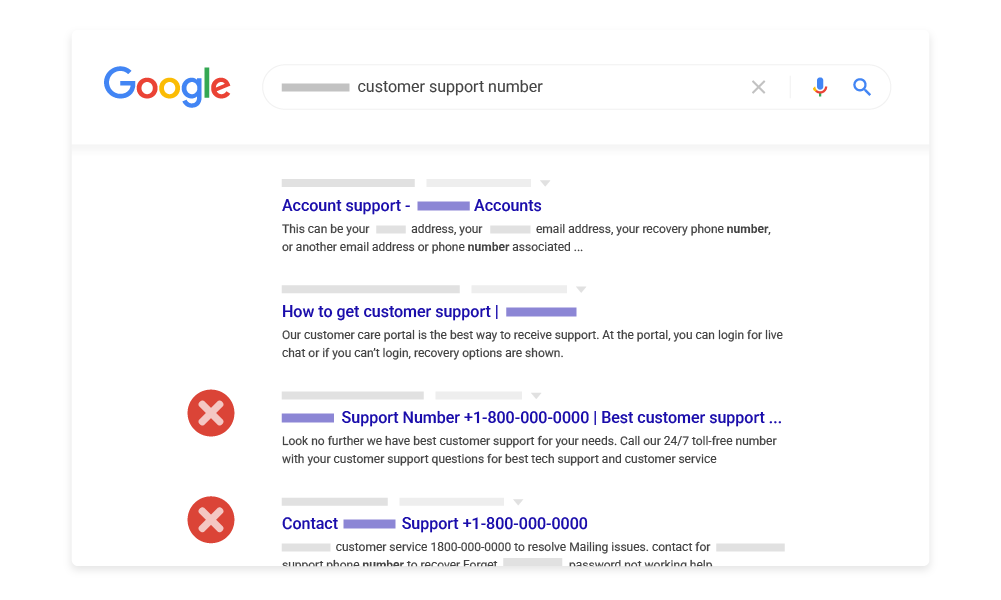2021 年 4 月 29 日,星期四

Google 搜索是一款功能强大的工具,可帮助您在开放网络中查找实用信息。遗憾的是,有些网页在创建时就“不安好心”。其中不乏专为欺骗用户而创建的网页,这些网页也是我们每天力求抵御的一种内容。为确保您的安全,并防止您的搜索体验遭到干扰性内容和恶意行为的损害,Google 搜索在 2020 年投入了多项创新。
更智能地抵御网络垃圾
早在 Google 搜索推出初期,我们就一直在抵御网络垃圾,而人工智能 (AI) 的近期发展为革新我们的方法提供了巨大潜力。
通过将我们对网络垃圾的深入了解与 AI 相结合,去年我们得以开发出我们自己的垃圾网站处理 AI,它能非常有效地发掘已知和新的网络垃圾趋势。例如,与几年前相比,我们将自动生成抄袭内容的网站减少了超过 80%。
尽管我们的检测能力已提升超过 50%,并且已从搜索结果中移除大多数被黑垃圾内容,但由于易受攻击的网站数量仍然庞大,2020 年被黑垃圾内容仍肆意泛滥。
这不是一个我们能够独自解决的问题。即使我们可以检测并抵御所有网络垃圾,黑客还是会继续利用漏洞,直至所有漏洞都得以修复。网站所有者可通过采取可靠的安全措施来保护其网站:相对于被黑后恢复内容,预防网站被黑的难度更低。Google 提供了各种资源,可帮助您了解网站遭到黑客入侵的最常见方式,以及如何使用 Search Console 检查您的网站是否遭到黑客入侵。请务必查阅这些内容,一起携手营造更安全的网络环境!
去年发生了许多重大事件(包括全球性疫情),我们开展了大量工作,旨在为对此类重要主题的数十亿次搜索提供更安全的体验。如果您正在寻找附近的 COVID 检测点,无需担心访问到可能会将您重定向到钓鱼式攻击网站的乱码网络垃圾。除了移除网络垃圾内容之外,我们还与其他一些搜索团队建立合作,确保您在重要关头获得最新、质量最优的信息。
防止网络垃圾侵扰用户
我们在提供一组 Google 搜索结果之前,会在后台执行许多操作。每天,我们都会探索、抓取数十亿网页并将其编入索引。这些网页中存在大量网络垃圾;每天,我们会发现 400 亿个垃圾网页。我们会采取以下措施,防止这些网络垃圾阻碍您搜索实用的信息。

首先,我们构建了一些系统,可在抓取网页或其他内容时检测网络垃圾。抓取是指我们的自动化系统访问内容并考虑是否予以编入索引,进而用于提供搜索结果。经检测判定为网络垃圾的一些内容不会编入索引中。
这些系统也适用于通过站点地图和 Search Console 发现的内容。例如,Search Console 中提供请求编入索引功能,以便创建者告知我们需要快速编入索引的新网页。我们发现,垃圾内容发布者会入侵易受攻击的网站,伪装成这些网站的所有者,在 Search Console 中验证自己的身份,然后使用此工具要求 Google 抓取他们创建的许多垃圾网页并将其编入索引。利用 AI,我们得以准确识别可疑的验证行为,并防止网络垃圾网址通过这种方式编入我们的索引。
接下来,我们构建了一些系统,可分析已编入我们索引中的内容。当您进行搜索时,这些系统会仔细检查相匹配的内容是否为网络垃圾。如果是,则相应内容不会显示在热门搜索结果中。我们还会利用这些信息改进系统,防止此类网络垃圾被编入索引。
得益于我们由 AI 辅助的自动化系统,用户在实际搜索时,很少会在热门搜索结果中看到网络垃圾。据估计,在这些自动化系统的帮助下,用户使用 Google 搜索进行查询时,在超过 99% 的情形下完全不会看到网络垃圾。对于极少数展现网络垃圾的情况,我们的团队会对其采取手动操作,并利用从中总结的教训进一步完善我们的自动化系统。
保护用户免遭其他滥用行为的侵扰

除了网络垃圾之外,2020 年我们还加大了力度,保护您免遭其他类型的滥用行为的侵扰。其中许多行为可能会导致严重的经济和人身伤害。
2020 年,我们在提高覆盖率方面取得了重大进展,进一步保护了更多用户免遭网上诈骗的侵扰。网上诈骗形式多样,与传统网络垃圾相比,可能会对您造成更多不利影响。例如,许多诈骗者会假装提供热门服务和产品的客户服务电话号码,意图诱使致电者通过银行转帐或礼品卡向其付款。这种诈骗方式通常称为“客户服务诈骗”或“技术服务支持诈骗”,我们已收到数十万用户的举报,在每个此类案件中,用户可能会向诈骗者支付数百美元。

从 2018 年起,我们的系统已能够通过检测疑似诈骗网站,每年成功保护数亿次搜索。在网络上,诈骗者会尝试通过关键字堆砌、仿冒品牌徽标以及希望用户拨打的电话号码,创建许多质量低劣的网站。我们的算法解决方案可确保诈骗网站不太可能显示在搜索结果中。这是我们去年启动的多项保护措施之一,旨在确保搜索结果的质量和您的安全。我们的使命是,直面挑战,为您提供最可信的搜索结果。与此同时,您还可以关注相关动态,了解诈骗相关知识,从而更好地保护自己。
发展 AI 的另一个巨大优势体现在理解网站的内容上。我们改进对商品评价、信息类网站和购物网站排名的方式就很好地证明了这一点。Google 搜索非常便于您在购物前先研究和查找商品。因此,我们通过奖励能体现更多深入研究且提供更多实用信息的内容,让您获得最有用的信息,并且下次以此做出购买决策。
尽管我们在处理垃圾网站方面的工作取得了重大进展,但垃圾内容发布者也在非常积极地开发新技术来避开我们的检测。我们一直致力于不断完善技术,防止用户受到新的滥用行为的侵扰,而用户举报对我们很有帮助。您最近使用 Google 搜索时有没有觉得受误导、欺骗或被垃圾内容侵扰?您是否认为我们在防范这些侵扰方面需要进一步加强?如果是,请通过垃圾信息举报分享反馈,并提供相关查询或任何其他可能有用的信息。

